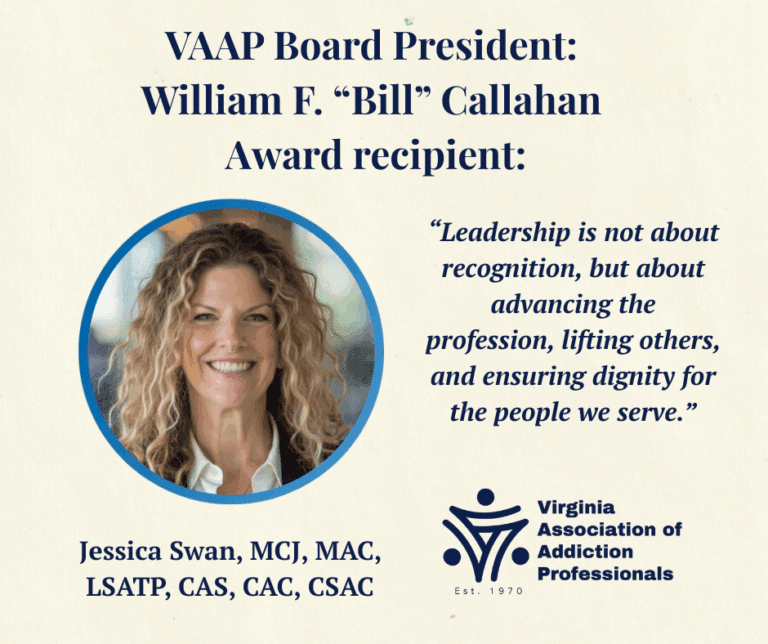The William F. “Bill” Callahan Award honors addiction professionals whose leadership, service, and integrity have made a lasting impact on the field. This year’s recipient, Jess [Last Name], has devoted more than 18 years to advancing family-centered recovery, mentoring professionals, and advocating for systemic change at both the local and national levels. In this Q&A, Jess reflects on the meaning of the award, the mentors who shaped her journey, and her hopes for the profession’s future.
How did you feel when you learned you’d been selected for the William F. “Bill” Callahan Award?
I felt profoundly grateful and overwhelmed. To be recognized with an award that bears Bill Callahan’s name and represents the highest standards of leadership in our field is awesome. My first thoughts went immediately to my family, who supported me from the very beginning of my own recovery, and to the mentors and colleagues who walked with me through every step of this journey. This award doesn’t feel like it belongs to me alone — it reflects the collective effort of so many people who have poured into my life and into this profession.
What does this recognition mean to you personally and professionally?
Personally, it’s a moment of gratitude — gratitude for the opportunity of recovery and transformation that is possible through ongoing personal work and support from the community. Professionally, it affirms that the work of centering families, advocating for systemic change, and mentoring others has made a lasting impact. It is also a reminder that integrity and compassion must always guide our path forward.
The award honors sustained, national-level service to the field of addiction counseling. Looking back, what contributions stand out most to you over the past 18+ years?
My journey began in Colorado, working with women and families impacted by addiction, trauma, and justice involvement. That work, under the guidance of mentors like Kasha Swiatkowski, inspired me to pursue a Master’s in Criminal Justice and led to my work in problem-solving courts, where I saw firsthand how justice systems can either perpetuate harm or become powerful tools for healing.
From there, my path expanded to national and global advocacy, the development of the FACE Recovery™ model, and founding Recovery Consulting. I’ve also been honored to serve as President of VAAP and to collaborate with colleagues across NAADAC and NAATP. Each contribution — whether local or international — has been about building bridges between people, families, professionals, and systems.
What part of Bill’s legacy resonates most with you?
Bill Callahan’s commitment to ethical, servant leadership resonates most with me. He understood that leadership is not about recognition, but about advancing the profession, lifting others, and ensuring dignity for the people we serve. I’ve seen those same values lived out in mentors like David Semanco and Ron Pritchard in Virginia, and Marvin Ventrell and Katie Strand nationally — leaders whose integrity and service-oriented vision remind me of Bill’s legacy.
What first drew you into this field?
I entered this field through my own recovery, much like many who came before me. From the beginning, I had the support of my family and the privilege of building relationships with remarkable people who remain my closest mentors and friends today. I realized early on that not everyone had these same opportunities and experiences.
Those early experiences showed me the profound power of community and the essential role families play in recovery. I recognized that the addiction counseling profession needed people who were willing to grow, to pursue continued education, and to bring that learning back into practice. It quickly became clear to me that centering families was not optional — it was necessary if people with addiction were to heal and sustain long-term recovery.
The intersection of lived experience, education, and family-centered care solidified my sense of purpose.
Founding Recovery Consulting – what inspired you to create it, and what impact are you most proud of?
Recovery Consulting was born from a vision of expanding family-centered, evidence-based care while also providing professionals with access to the tools, training, and research they need to serve effectively. I wanted to create something that would connect the dots between clinical excellence, systemic advocacy, and global collaboration.
What I’m most proud of is how Recovery Consulting has combined specialized services, professional training, and research access in a way that builds resilience not only in individuals, but also in families and entire communities. Watching that vision grow into a platform that has impact far beyond Virginia is incredibly meaningful.
Mentorship is highlighted as a core part of your work. What role has mentoring others played in your own career, and what advice do you share most often with emerging professionals?
Mentorship has shaped every part of my journey. In my earliest days, Denise Bersos and Suzanne Franz gave me a foundation in this work. In Colorado, Kasha Swiatkowski guided me in problem-solving courts. Joseph Henry and Meg Basten offered personal mentorship that taught me as much about life as about professional practice.
Here in Virginia, David Semanco and Ron Pritchard modeled what servant leadership looks like. At NAATP, I’ve learned from Marvin Ventrell and Katie Strand, while colleagues like Jay White, Stacey McClellan, and Megan Davidson continue to inspire me and push my thinking.
Because of all of them, I see mentorship as both a responsibility and a privilege. The advice I share most often is: stay rooted in compassion, never stop learning, and lead with integrity even when it’s hard. None of us walks this path alone, and part of our role is to make sure the next generation feels supported, challenged, and encouraged.
How do you balance serving on the national stage while staying deeply connected to your local community?
For me, the national and local work feed each other. National service allows me to advocate for systemic change and bring resources and innovations back to Virginia. Local work grounds me in the lived realities of families, counselors, and communities. Staying deeply connected to people here — through VAAP, through my own recovery community, through direct work with families — ensures that everything I do nationally remains responsive and practical.
What do you hope this award helps bring attention to within the field of addiction counseling?
I hope it brings greater attention to the importance of family-centered recovery and the need for systemic equity. Families are often left out of treatment, even though their healing is central to sustained recovery. People impacted by the criminal justice system also face enormous barriers and do not have the compassion they deserve. This award provides a platform to remind us that recovery is not just about treating symptoms, but about restoring dignity, relationships, and communities.
Where do you see the most pressing needs — and opportunities — for the profession in the years ahead?
We face urgent workforce challenges. We need to support, train, and retain counselors at every level of the profession. There is also a pressing need to ensure that evidence-based practices are implemented in ways that respect diverse communities and family systems. That means we need to pay counselors more and provide them with more support staff to do their jobs effectively. We need to improve the pay structures for addiction treatment. We need to improve access to care. We need to improve the public perception of addiction and treatment for it.
At the same time, we have tremendous opportunities. Collaboration between treatment providers, families, communities, and systems like criminal justice, education, and healthcare can create integrated pathways to recovery. If we lean into that, we can build a more inclusive, equitable, and resilient profession.
If you could speak directly to the next generation of counselors, what message would you want them to hear?
I would tell them: Your education and work matter more than you know. Every client you serve, every family you engage, every act of compassion you extend ripples outward. Lead with integrity. Stay curious. Invest in your own growth. And know that this profession is bigger than any one of us — you are part of a continuum of care and leadership that will shape the future of addiction services.
And just as I was supported by mentors by so many, you too will find people to walk beside you. Ask for support. Lean into those relationships — and then pay it forward.
VAAP is proud and fortunate to be under Jess’s leadership, where her vision, integrity, and compassion continue to inspire our community. Please join us in congratulating her on receiving the William F. “Bill” Callahan Award, a well-deserved honor that reflects her dedication to families, professionals, and the future of addiction counseling.

